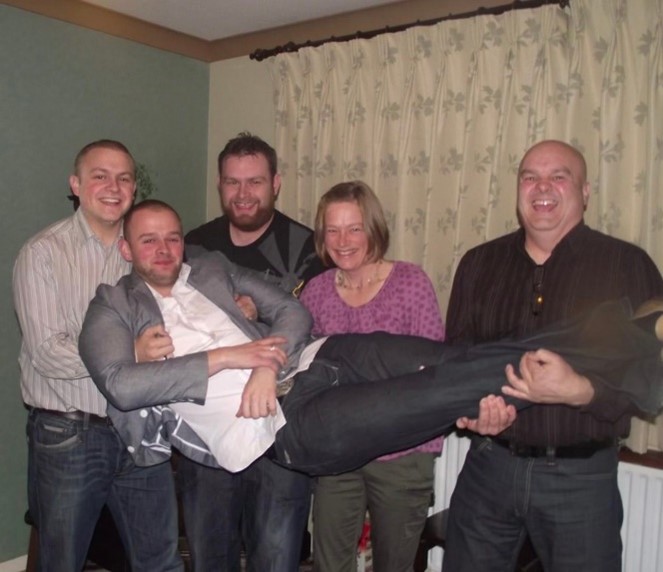A Coroner has concluded that a 55-year-old man, from East Sussex, died as a result of thrombolysis treatment (Alteplase) given to him, which was contrary to NHS Trust guidance and protocols and that the care provided to him was sub optimal.

David Morton-Holmes right, with his wife Hazel and their sons Guy, Lloyd, Guy and Greg.
The inquest into David Morton-Holmes took place on 17 May 2022. His family have criticised East Sussex Healthcare NHS Trust in particular because it has taken three years for the Trust to publicly acknowledge that the care provided to Mr Morton-Holmes was negligent.
Mr Morton-Holmes was taken to the Conquest Hospital on 4 February 2019, after flying home from holiday the previous day. His blood pressure was raised, with some numbness in his left arm. A head CT scan was arranged which showed some very mild changes. Despite this, a decision was made to administer Alteplase – an anticoagulant that affects blood clotting.
The family were aware very early on that a Serious Incident Investigation would be conducted and they received the report in 2019. This did not indicate any failings in care and advised his death was not avoidable. However, shortly before the pre inquest review in November 2019, as part of the disclosure process, they received an internal email form a specialist nurse identifying issues with the report. Despite raising these concerns with the Trust and Coroner the report remained unchanged.
The inquest was then delayed, due to COVID-19, and eventually listed for 11 October 2021. During the interim period, the family continued to ask the hospital to address its investigation conclusions. It admitted liability for Mr Morton-Holmes death in May 2021, but the investigation report remained unchanged. This formed part of the evidence to be considered by the Coroner.
On 6 October 2021, five days before the inquest was due to be heard, and some 23 months after it was brought to the Trust’s legal team and Coroner’s attention, the hospital wrote to the Coroner requesting that it was postponed again, so they could rewrite their investigation report. The Coroner agreed and the family were informed after the decision had been made.
Despite this, the family and Coroner were not provided with the updated investigation until April 2022. The investigation is now substantially different from the previous version. This report, which identifies the errors made and the fact they caused Mr Morton-Holmes’ death.
The family complained to the Chief Executive of East Sussex Healthcare NHS Trust about the apparent disregard for their feelings. They highlighted the failures to promptly address the errors in care or ensure the inquest could be concluded in a timely manner and that lessons could have been learned much earlier.
They received a response four months later, which apologised for the distress to the family, but did not provide a meaningful reason why the investigation report had been inaccurate in the first instance or why it had taken so long to revise.
Partner and Head of the Inquest team, Lynda Reynolds, represented the family as Solicitor. She said:
This has been a case where it was clear that there had been a tragic failure in the care provided to Mr Morton-Holmes. Instead of recognising the errors, which were highlighted in internal emails the Trust decided to attempt to stand by an investigation that was not credible.
The family have been treated appallingly by the Trust with no recognition of their continued distress in failing to address the fundamental failures that led to Mr Morton-Holmes death.
The request to postpone the inquest in October 2021 after knowing that the investigation was inadequate from at least November 2019 was inexcusable. The family had already lived in the knowledge they would have to attend the inquest for two and a half years to then have it postponed caused huge distress.
It is now over three years since Mr Morton-Holmes death and they have only just concluded the inquest.
I understand that errors occur, and in themselves these were very serious errors in judgment and failing to follow all the relevant protocols, but to add to this the apparent disregard for the family in the time following Mr Morton-Holmes death requires an explanation at the highest level.
The family want to ensure that their loss is recognised and that lessons have been learned.
Background
It is now recognised that Mr Morton-Holmes did not meet ANY of the criteria for administering Alteplase but, despite this, he was given it – and without the close monitoring it requires.
Mr Morton-Holmes deteriorated shortly after it was administered and a repeat CT scan showed numerous areas of bleeding in his brain. He was then transferred to Eastbourne Hospital but died on 8 February 2019.
The Trust has admitted that there were no specialist staff at Conquest Hospital as stroke services are based at Eastbourne Hospital. This was a factor in the decision to administer the Alteplase and failure to closely monitor Mr Morton-Holmes.

